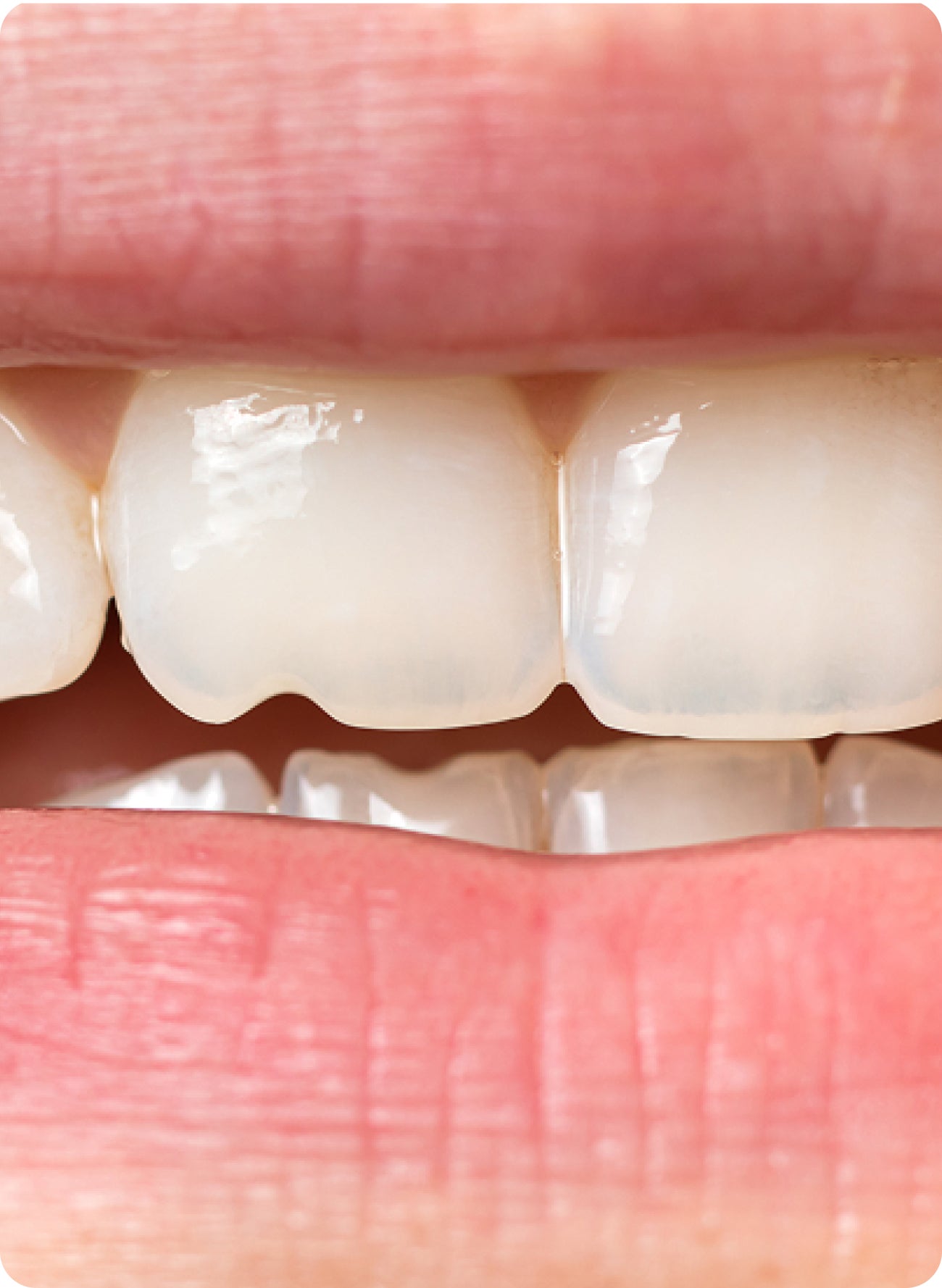Last updated 09.17.2025
Cracked tooth: symptoms, causes and treatment options
Discover cracked tooth symptoms, causes, and treatments to protect your smile with expert care from Aspen Dental.

A cracked tooth can turn simple pleasures, like biting into a crisp apple or enjoying a scoop of ice cream, into a painful experience. While you might not always see a crack or feel constant pain, it’s a problem that needs a dentist's attention to prevent bigger issues down the road and keep your smile healthy. Understanding the signs, causes and treatment options helps you take control of your oral health.
At Aspen Dental, we’ve helped many patients find relief from cracked teeth with modern treatments and a gentle touch. Whether you're dealing with occasional sensitivity or a sudden, sharp pain, getting it checked out early is the best way to save your tooth.
Understanding cracked teeth and why they occur
Your teeth are incredibly strong, built to handle years of chewing and grinding. Each tooth has three main layers: the tough outer enamel, the softer middle layer called dentin and the inner pulp, which contains nerves and blood vessels. When a crack breaks through these layers, it can expose sensitive areas and let bacteria in. The deeper the crack, the higher the risk of irritation or infection. That’s why acting quickly is so important.
Why do teeth crack easily?
Several things can make a tooth more likely to crack. As we get older, our enamel can get thinner and more brittle, which is why adults over 50 are more prone to cracks. Large fillings can weaken a tooth’s structure, leaving the remaining enamel with less support. Grinding or clenching your teeth puts a lot of stress on your molars, which can lead to tiny fractures that grow over time. And sometimes, a sudden impact from a fall or a sports injury can crack a tooth instantly.
Types of tooth cracks
Not all cracks are the same. Knowing the different types helps your dentist at Aspen Dental determine the best treatment.
Craze lines: These are very small, shallow cracks in the enamel. They don't cause pain and usually don't need any treatment.
Fractured cusps: This happens when a piece of the tooth’s chewing surface breaks off, often around a filling.
Cracked teeth: This is a vertical crack that runs from the chewing surface down towards the root. Without treatment, it can get worse.
Split teeth: If a cracked tooth isn't treated, it can eventually split into separate pieces. This often means the tooth needs to be removed.
Vertical root fractures: These cracks start in the root of the tooth and move upward. They often don't have many symptoms until an infection develops, and they can be difficult to treat.
Recognizing cracked tooth symptoms
The signs of a cracked tooth can be a little different from other dental issues. Unlike a cavity that might cause a constant ache, pain from a cracked tooth often comes and goes. This happens because chewing can cause the cracked pieces of the tooth to flex and irritate the nerve. Temperature changes can also trigger sensitivity.
Common warning signs include:
Sharp pain when you bite down or chew
Sensitivity to hot, cold, or sweet foods and drinks
Pain that appears and disappears
Swelling in the gum around the sore tooth
A visible line or discoloration on the tooth
Pain that feels worse when you lie down
Cracked tooth symptoms and remedies for immediate relief
While you wait for your dental appointment, there are a few things you can do at home to manage the discomfort safely.
Rinse your mouth with warm salt water to soothe the area.
Apply a cold compress to the outside of your cheek for 15-20 minutes at a time.
Take an over-the-counter anti-inflammatory medicine, following the package directions.
Try to chew on the other side of your mouth and stick to soft foods.
Avoid very hot or cold foods and drinks if they cause pain.
Important: Never put aspirin directly on your tooth or gums, as it can burn the tissue. These home remedies are just for temporary relief; only a dentist can fix the underlying problem.
When is a cracked tooth an emergency?
You should seek emergency dental care right away if you experience:
Sudden, severe pain that doesn't get better with pain relievers
Swelling in your face or gums that comes on quickly
A fever along with your tooth pain
A visible piece of your tooth breaking off
Signs of an infection, like a bad taste in your mouth or swollen glands in your neck
What causes teeth to crack
Understanding what causes teeth to crack can help you prevent future problems. The causes usually fall into three main categories.
Mechanical stress factors
Biting down on hard things like ice, nut shells or popcorn kernels can put too much pressure on your teeth. Using your teeth to open things or habits like chewing on pens can also create stress over time. Teeth grinding (also called bruxism) is a major culprit, especially since it often happens while you sleep. A custom-fit night guard can help absorb that pressure. Dental injuries from falls or sports can also create tiny fractures that may not cause problems until later.
Structural vulnerabilities
Large fillings can weaken a tooth by replacing its natural structure. Teeth that have had a root canal can also become more brittle because they no longer have a living pulp inside. If your bite isn't aligned correctly, some teeth may take on more pressure than others, making them more likely to crack.
Age and environmental factors
As we age, our enamel naturally thins out. Big, sudden temperature changes—like drinking hot coffee followed by ice water—cause teeth to expand and contract, which can be stressful for them. Acid from sugary drinks, sodas or even acid reflux can also wear down enamel and leave teeth more vulnerable.
Effects of teeth grinding on cracked teeth
Teeth grinding can make existing cracks worse and even cause new ones. The constant pressure can turn tiny stress lines into bigger problems that require more involved treatment. If you grind your teeth, a custom night guard is one of the best ways to protect them. Taking this step can often be the difference between needing a simple fix now versus a more complex one later.
How dentists diagnose hairline tooth fractures
Diagnosing a cracked tooth can be tricky because the symptoms can be similar to other issues, and cracks don't always show up on X-rays. Your dentist will start by asking about your symptoms and dental history, followed by a careful examination.
They may use a few special techniques to find the problem:
Transillumination: A bright light is shined through the tooth to make any hidden cracks visible.
Dental dyes: A special stain can be applied to the tooth to highlight fracture lines.
Bite tests: You may be asked to bite down on a small tool to pinpoint which tooth is causing the pain.
Periodontal probing: Your dentist will measure the gums around the tooth to see if a crack extends below the gumline.
Hairline fractures are very small and can cause symptoms long before they are easy to see. Catching them early makes a big difference, so it’s best to schedule an appointment if you suspect a crack.
Treatment options: from simple bonding to complex restoration
Successful treatment often depends on catching the crack early. The longer it goes untreated, the higher the risk of infection and potentially losing the tooth. Your dentist will always recommend the most conservative option that will reliably protect your tooth for the long run.
Conservative treatments for minor cracks
For small cracks, especially on front teeth, dental bonding uses a tooth-colored material to fill and seal the fracture. This is usually done in one visit. Sometimes, minor reshaping of the tooth can smooth any sharp edges.
Protective restorations for moderate damage
Inlays and onlays are custom-made restorations that reinforce the cracked area while saving as much of your healthy tooth as possible. If a crack has weakened the whole tooth, a dental crown is often the best solution. A crown acts like a cap that covers the tooth, holding it together and spreading out the force from biting.
Best treatment for cracked molars in 2025
Cracked molars are a unique challenge because they take the most pressure from chewing. Modern treatments focus on using durable materials and ensuring a perfect fit. A crown might be all you need if the crack hasn't reached the pulp. If it has, a root canal followed by a crown is often the best way to save the tooth. If the crack runs below the gumline or the tooth has split, removing it may be the healthiest option.
Root canal therapy for pulp involvement
When a crack allows bacteria to get into the tooth’s pulp, a root canal is needed. The procedure removes the infected tissue, cleans the inside of the tooth and seals it to prevent another infection. Afterward, a crown is placed on the tooth to protect it.
Extraction and replacement options
If a tooth is too damaged to be saved, your dentist may recommend a tooth extraction. You have several options for replacing it, including dental implants, bridges or partial dentures. Your dentist will discuss the best choice for you based on your health, budget and long-term goals.
Cost of cracked tooth repair vs extraction in 2025
The cost of repair can vary. Simpler treatments like bonding are generally less expensive than more complex ones like crowns or root canals. In many cases, saving a tooth costs less than removing and replacing it, which is why early treatment is often the more affordable path. At Aspen Dental, we provide a clear cost estimate before any work begins and can talk you through payment options.
Supporting treatments
If grinding is a factor, a custom night guard can protect your teeth from further damage. Sometimes, minor bite adjustments can help distribute pressure more evenly. Your dentist might also suggest replacing large, old fillings that could be weakening a tooth.
Managing pain from a cracked tooth at home
While waiting for your appointment, these steps can offer some temporary relief.
Immediate pain relief measures:
Rinse with warm salt water a few times a day.
Use a cold compress on your cheek for 15-20 minutes at a time.
Take an over-the-counter anti-inflammatory medication as directed.
Avoid very hot or cold foods and hard or chewy foods.
Try sleeping with your head slightly elevated to reduce throbbing pain.
What to avoid: Don't put aspirin directly on your tooth, and try not to overuse numbing gels. Remember, these are just temporary fixes.
Long-term prognosis and prevention
With the right treatment, most cracked teeth can continue to function normally for many years. Crowns offer excellent long-term protection, though very deep cracks can sometimes worsen even after treatment. Regular check-ups allow your dentist to monitor your tooth and catch any new issues early.
How to prevent teeth from cracking
A few simple habits can make a big difference in preventing cracks.
Protective habits: Keep up with brushing and flossing, see your dentist for regular check-ups, wear a night guard if you grind your teeth and use a mouthguard for contact sports.
Dietary considerations: Avoid chewing on ice or hard candy and don’t use your teeth as tools. Be careful with hard foods like popcorn kernels.
Address underlying issues: Talk to your dentist about any concerns with your bite, find healthy ways to manage stress that might cause clenching and consider replacing old, large fillings.
Your path to relief and restoration
A cracked tooth doesn’t have to disrupt your life. With an early diagnosis and a solid treatment plan, most cracked teeth can be saved so you can get back to normal. At Aspen Dental, our experienced teams use modern technology to treat cracked teeth comfortably and effectively.
Schedule an appointment today to learn more about your options. The sooner you address a cracked tooth, the better the outcome for your smile. We're here to help you get back to eating, talking and smiling with confidence.
Cracked tooth FAQs
Can a cracked tooth heal on its own?
Unfortunately, no. Tooth enamel can't repair itself. A crack needs to be treated by a dentist to stop it from getting worse and to protect the tooth.
Does a cracked tooth need to be pulled?
Not always. Many cracked teeth can be saved with early treatment. Extraction is usually the last resort for teeth with very deep cracks that can't be restored.
How much does it cost to fix a cracked tooth?
The cost depends on how serious the crack is and what kind of treatment you need. Your Aspen Dental team will give you a clear estimate and go over all your options.
Does dental insurance cover cracked tooth repair?
Coverage depends on your specific plan. Many insurance plans do help cover restorative treatments like fillings and crowns. Please note, we do not accept Medicaid. We can help you check your benefits before you start treatment.
Can a cracked tooth be fixed at home?
Home remedies can help with the pain but they can't fix the crack. Only a dentist can properly diagnose the problem and provide the right treatment.
When should I see an emergency dentist for a cracked tooth?
You should get help right away for severe pain, swelling, a fever or if a piece of your tooth breaks off. Even if your symptoms aren't an emergency, it's important to have the tooth checked as soon as possible.



